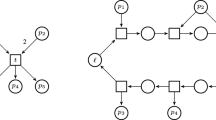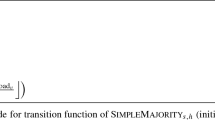Abstract
Population protocols are a model of distributed computation in which an arbitrary number of indistinguishable finite-state agents interact in pairs to decide some property of their initial configuration. We investigate the behaviour of population protocols under adversarial faults that cause agents to silently crash and no longer interact with other agents. As a starting point, we consider the property “the number of agents exceeds a given threshold t”, represented by the predicate \(x \ge t\), and show that the standard protocol for \(x \ge t\) is very fragile: one single crash in a computation with \(x:=2t-1\) agents can already cause the protocol to answer incorrectly that \(x \ge t\) does not hold. However, a slightly less known protocol is robust: for any number \(t' \ge t\) of agents, at least \(t' - t+1\) crashes must occur for the protocol to answer that the property does not hold.
We formally define robustness for arbitrary population protocols, and investigate the question whether every predicate computable by population protocols has a robust protocol. Angluin et al. proved in 2007 that population protocols decide exactly the Presburger predicates, which can be represented as Boolean combinations of threshold predicates of the form \(\sum _{i=1}^n a_i \cdot x_i \ge t\) for \(a_1,...,a_n, t \in \mathbb {Z}\) and modulo prdicates of the form \(\sum _{i=1}^n a_i \cdot x_i \bmod m \ge t \) for \(a_1, \ldots , a_n, m, t \in \mathbb {N}\). We design robust protocols for all threshold and modulo predicates. We also show that, unfortunately, the techniques in the literature that construct a protocol for a Boolean combination of predicates given protocols for the conjuncts do not preserve robustness. So the question remains open.
Access this chapter
Tax calculation will be finalised at checkout
Purchases are for personal use only
Similar content being viewed by others
Notes
- 1.
Ninjas are superstitious.
References
Alistarh, D., Dudek, B., Kosowski, A., Soloveichik, D., Uznanski, P.: Robust detection in leak-prone population protocols. CoRR abs/1706.09937 (2017). http://arxiv.org/abs/1706.09937
Alistarh, D., Töpfer, M., Uznanski, P.: Comparison dynamics in population protocols. In: Miller, A., Censor-Hillel, K., Korhonen, J.H. (eds.) PODC 2021: ACM Symposium on Principles of Distributed Computing, Virtual Event, Italy, 26–30 July 2021, pp. 55–65. ACM (2021). https://doi.org/10.1145/3465084.3467915
Angluin, D., Aspnes, J., Diamadi, Z., Fischer, M.J., Peralta, R.: Computation in networks of passively mobile finite-state sensors. Distrib. Comput. 18(4), 235–253 (2006). https://doi.org/10.1007/s00446-005-0138-3
Angluin, D., Aspnes, J., Eisenstat, D., Ruppert, E.: The computational power of population protocols. Distrib. Comput. 20(4), 279–304 (2007)
Blondin, M., Esparza, J., Jaax, S., Kucera, A.: Black ninjas in the dark: formal analysis of population protocols. In: LICS, pp. 1–10. ACM (2018)
Czerner, P., Guttenberg, R., Helfrich, M., Esparza, J.: Fast and succinct population protocols for presburger arithmetic. J. Comput. Syst. Sci. 140, 103481 (2024)
Delporte-Gallet, C., Fauconnier, H., Guerraoui, R., Ruppert, E.: When birds die: making population protocols fault-tolerant. In: Gibbons, P.B., Abdelzaher, T., Aspnes, J., Rao, R. (eds.) DCOSS 2006. LNCS, vol. 4026, pp. 51–66. Springer, Heidelberg (2006). https://doi.org/10.1007/11776178_4
Guerraoui, R., Ruppert, E.: Names trump malice: tiny mobile agents can tolerate byzantine failures. In: Albers, S., Marchetti-Spaccamela, A., Matias, Y., Nikoletseas, S., Thomas, W. (eds.) ICALP 2009. LNCS, vol. 5556, pp. 484–495. Springer, Heidelberg (2009). https://doi.org/10.1007/978-3-642-02930-1_40
Author information
Authors and Affiliations
Corresponding author
Editor information
Editors and Affiliations
Rights and permissions
Copyright information
© 2025 The Author(s), under exclusive license to Springer Nature Switzerland AG
About this chapter
Cite this chapter
Lossin, B., Czerner, P., Esparza, J., Guttenberg, R., Prehn, T. (2025). The Black Ninjas and the Sniper: On Robust Population Protocols. In: Jansen, N., et al. Principles of Verification: Cycling the Probabilistic Landscape . Lecture Notes in Computer Science, vol 15262. Springer, Cham. https://doi.org/10.1007/978-3-031-75778-5_10
Download citation
DOI: https://doi.org/10.1007/978-3-031-75778-5_10
Published:
Publisher Name: Springer, Cham
Print ISBN: 978-3-031-75777-8
Online ISBN: 978-3-031-75778-5
eBook Packages: Computer ScienceComputer Science (R0)




